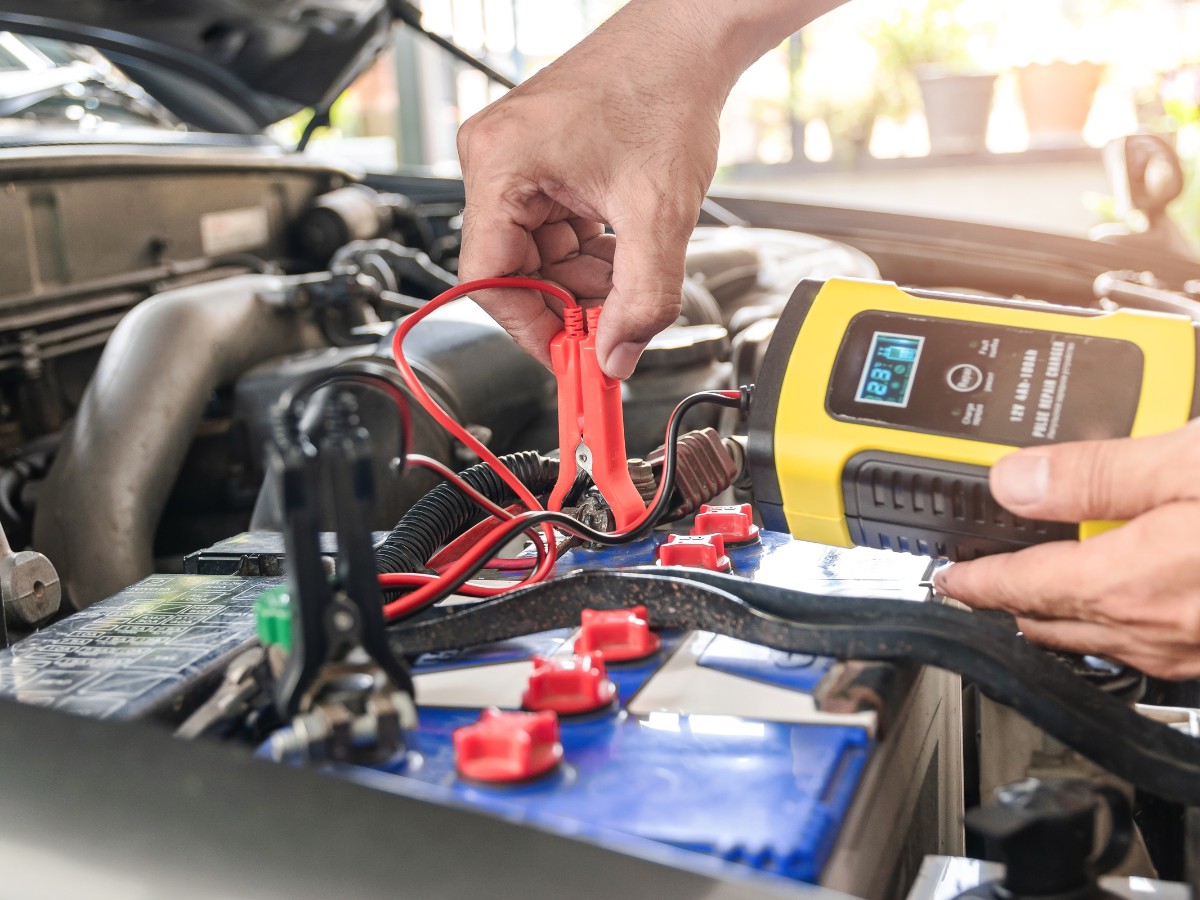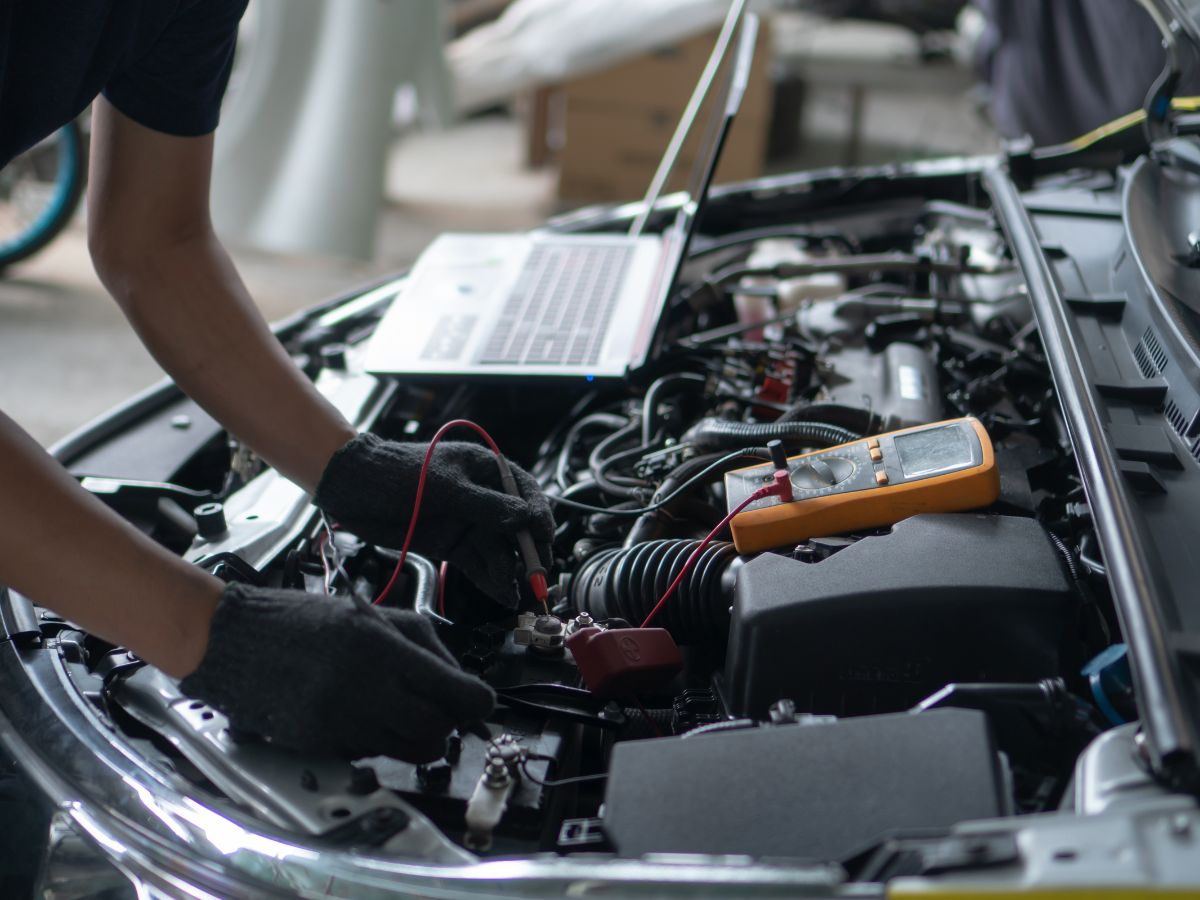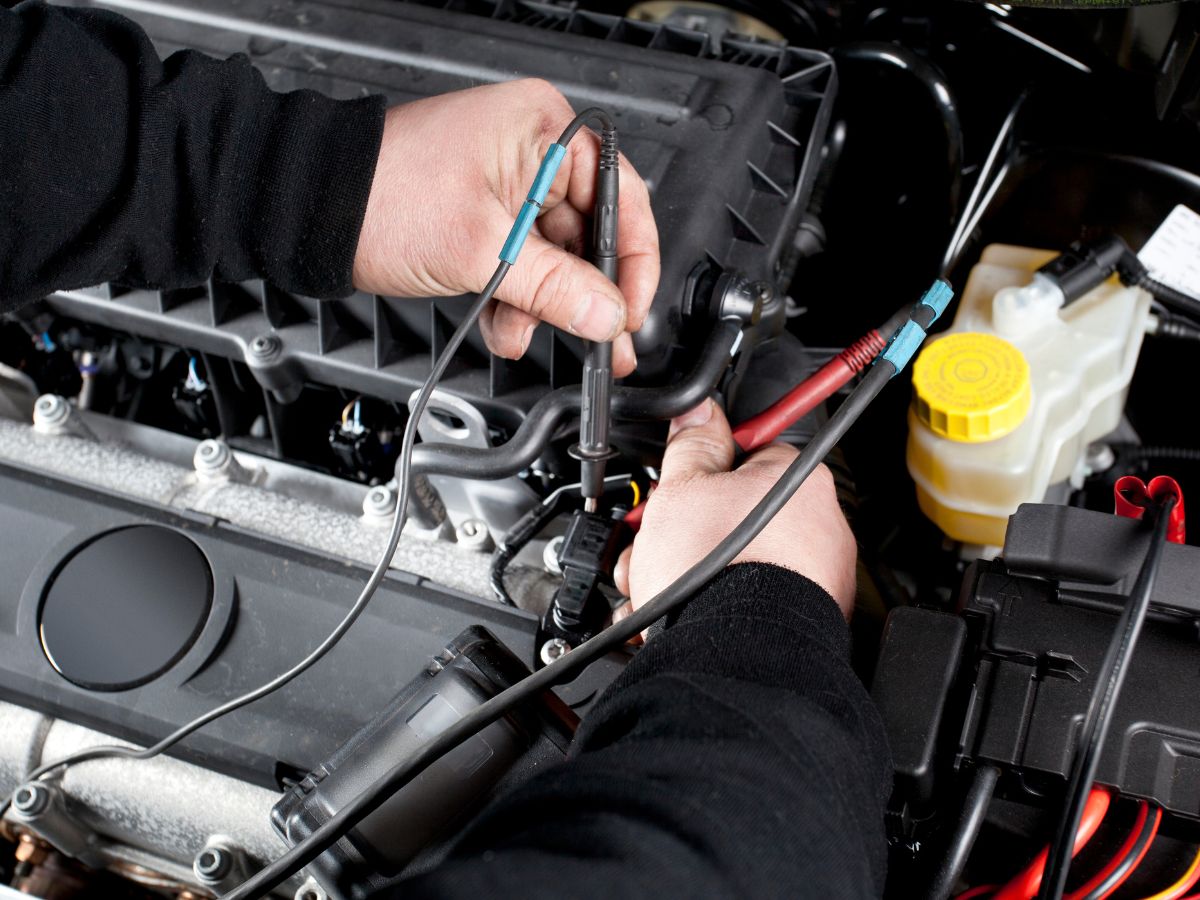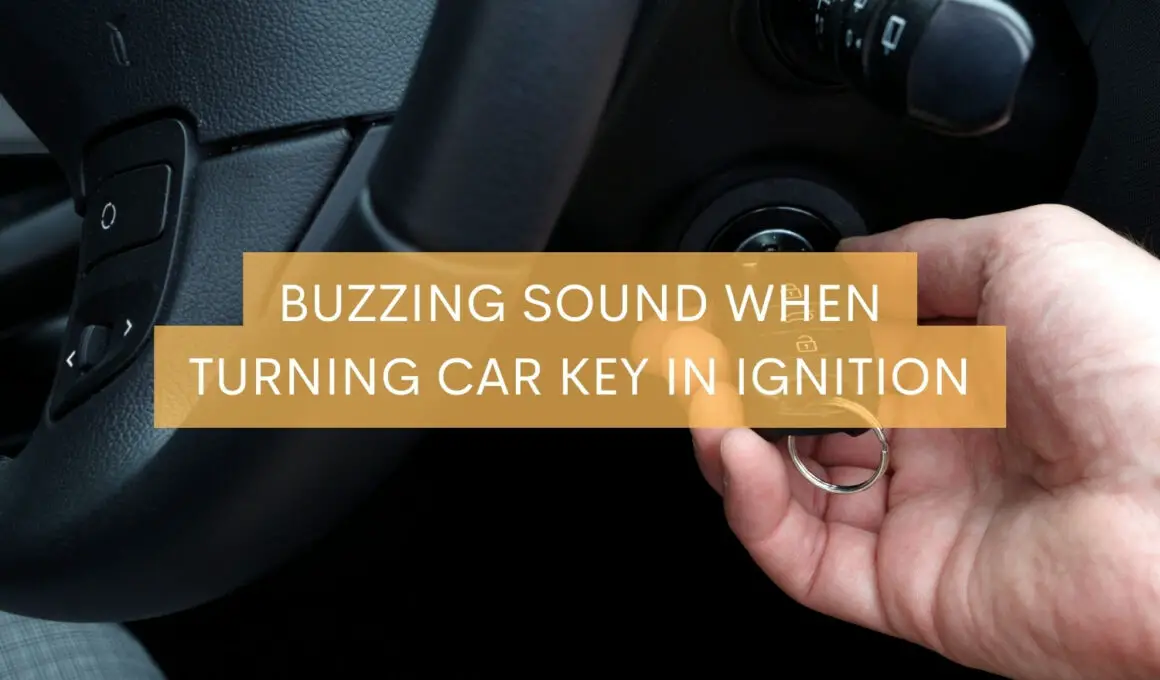In This Article Show
Have you ever found yourself in a situation where you slide your car key into the ignition, turn it, and instead of the familiar sound of the engine revving to life, you’re met with an unusual buzzing sound? If so, it’s vital not to ignore this warning sign.
This article will explore the causes and potential solutions for a buzzing sound from your car ignition system. Just as the heart is vital to the human body, so too is your car’s ignition system. It brings your vehicle to life, and a buzzing sound can indicate something isn’t quite right.
We’ll cover potential causes such as a dying car battery, starter motor problems, issues with the ignition switch, or even poor electrical connections. You’ll learn how to diagnose these common issues, when to seek professional help, and how you can troubleshoot them at home.
Not only will we talk about possible fixes, such as car battery replacement, starter motor repair, or fixing electrical connections, but we’ll also offer tips on preventive car care to help you avoid future ignition-related problems.
What Causes a Buzzing Sound When Turning Your Car Key in the Ignition?
Here are a few things that might cause a buzzing sound when you turn your car key in the ignition.
1. Dead or Dying Battery
The battery is the lifeblood of your car’s electrical system. It provides the juice needed to power all your car’s electrical components, including the ignition system. When you turn your car key in the ignition, the battery sends energy to the starter motor, crushing the engine.
If the battery is dead or dying, it might not have enough power to do this. Symptoms of a dying battery might include a slow crank when you try to start the car, dimming headlights, and yes, a buzzing or clicking sound when turning the key.
The buzzing is your car’s way of telling you that there’s insufficient power to start the engine. A battery’s lifespan can vary, but typically, it’s around 3-5 years. If your battery is around this age, or if you’ve noticed these symptoms, a dying battery could be the culprit.

2. Starter Motor Issues
The starter motor plays a critical role in starting your car. It takes the electrical charge from the battery and uses it to drive a small gear that interlocks with a larger gear on the engine, which in turn starts the car.
However, starter motors can wear out or break over time. Common signs of a failing starter motor include a grinding noise, freewheeling (when you hear a whining noise from the engine, but the engine itself isn’t turning over), smoke (a sign of too much power being drawn through the electrical supply to the starter), and the buzzing sound you’re experiencing.
A faulty starter is a common issue that can result in that annoying buzzing noise when you turn the key.
3. Ignition Switch Problems
The ignition switch is essentially the control hub for your car’s starter motor and other electrical devices. When you insert your car key into the ignition switch and turn it, the switch should power up the car’s ignition system and starter motor.
Over time, the ignition switch can wear out or become faulty, and when it does, it may not transmit enough power (or any power at all) to the starter motor.
Signs of a failing ignition switch can include stalling, issues with starting your car, problems with power accessories like your radio or power windows, or a buzzing or clicking noise when you turn the key.
4. Poor Electrical Connections
A car is a collection of wires; all it takes is a single loose or corroded connection to cause problems. The electricity from the car battery needs to flow freely to the starter motor and other car components.
A weak or broken connection could result in a drop in power, leading to a buzzing sound when turning your car key in the ignition. Regularly checking under the hood and ensuring all electrical connections are clean and secure can prevent this issue.
Now that we’ve explored these potential causes in-depth, we’ll look at how you can troubleshoot each one and provide tips on when it’s best to seek professional help.
Over the years, I’ve seen firsthand how understanding and addressing these common car issues can significantly enhance a vehicle’s performance and lifespan.
The Impact of Ignoring the Buzzing Sound in the Ignition
Ignoring unusual car noises, like the buzzing sound when turning the car key in the ignition, is bad for your car and can also impact your safety and wallet. Let’s delve into why you should not disregard this sound:
1. Potential Damage
Ignoring the buzzing sound could lead to significant damage over time. If the issue is a dying battery, continued attempts to start the car might drain it completely, possibly damaging the battery beyond repair.
If the starter motor is faulty, persisting to start your car could wear out the motor completely, resulting in a costly replacement.
Similarly, a problematic ignition switch or poor unaddressed electrical connections might lead to more severe electrical issues in the vehicle.

2. Safety Risks
Ignoring these warning signs might also compromise your safety. A dying battery, faulty starter motor, or problematic ignition switch could result in your car unexpectedly breaking down in the middle of the road, leading to dangerous situations.
On top of that, poor electrical connections might increase the fire risk, especially if there’s a short circuit.
3. Repair Costs
The longer you wait to address these issues, the more expensive the repair costs could be. What might initially be a simple and affordable fix, such as replacing a battery or tightening an electrical connection, could turn into replacing entire parts, like the starter motor or the ignition switch, which will be more costly.
Identifying and addressing issues early on can save you from expensive repairs and risky situations in the future. As a mechanic with 15 years of experience, I’ve witnessed countless times how proactive vehicle maintenance can lead to safer, smoother drives and longer-lasting cars.
How to Troubleshoot the Buzzing Sound When Turning Your Car Key in the Ignition
Knowing how to troubleshoot when faced with a buzzing sound in your car’s ignition can help you pinpoint the problem. Remember, addressing these issues early is always important to avoid potential damage. Here’s how to diagnose the common causes we discussed earlier:
1. Checking the Car Battery
A quick check you can do is to see if your car’s lights, radio, or air conditioning work. If they’re functioning, but the car isn’t starting, you might have a battery problem. A more accurate method is using a multimeter to check your car battery’s voltage. Your battery might need charging or replacement if it reads less than 12.6 volts.
2. Inspecting the Starter Motor
Listen closely when you turn the car key. If you hear a clicking sound but the engine doesn’t start, the issue could be with the starter motor. However, diagnosing starter motor issues can be complex, and it’s often best to inspect it by a professional mechanic.
3. Assessing the Ignition Switch
If your car’s electrical accessories (like lights or radio) work in the ‘ON’ position, but your car won’t start, the problem might be the ignition switch. Inconsistent operation of electrical components can also suggest an ignition switch issue.
However, due to the complexity of this part, it’s usually best to have it examined by a professional.

4. Examining Electrical Connections
A visual check of your car’s electrical connections can help identify any apparent loose or corroded wires. Please note that this should only be done when the vehicle is off to avoid the risk of electrical shock.
Always remember, if you’re unsure or uncomfortable diagnosing car issues, it’s best to seek professional help. Working on cars involves certain risks, especially when dealing with electrical components.
Plus, having your car inspected by a professional mechanic can sometimes reveal problems that might not be apparent to the untrained eye.
Fixes for a Buzzing Sound When Turning Your Car Key in the Ignition
Now that we’ve covered how to diagnose the causes of a buzzing sound when turning the car key in the ignition, let’s dive into potential solutions:
1. Addressing Battery Issues
If your car battery is dead or dying, the most straightforward solution is a replacement. Car batteries have a finite lifespan; replacing them every 3-5 years is generally a good practice. Having a professional install your car battery is best to ensure it’s done safely and correctly.
2. Fixing Starter Motor Problems
The starter motor may require repair or replacement if it is the culprit. This process can be intricate as it involves working with the car’s electrical system, and it’s generally recommended to have this done by a professional mechanic.
3. Resolving Ignition Switch Issues
If the problem lies with the ignition switch, it will likely need to be replaced. Replacing an ignition switch involves careful handling of your car’s ignition system and should be carried out by a professional to ensure safety and accuracy.
4. Correcting Poor Electrical Connections
Loose or corroded electrical connections can often be fixed by tightening the connections or cleaning the corrosion.
For significant corrosion or damaged wires, replacement might be the best option. As with any work involving the electrical system, it’s safer and generally better to have these issues addressed by a professional.
Wrapping it up
From a dead or dying battery to a faulty ignition switch, there are several potential reasons for hearing a buzzing sound when turning your car key in the ignition. This buzzing is your car’s way of communicating that something isn’t quite right, and it’s important not to ignore this call.
As we’ve seen, timely identification and remediation of these issues can save you from more serious damage, potential safety risks, and substantial repair costs down the line. Remember, preventative care is always cheaper and more effective than reactive repairs.
While it’s beneficial to understand these potential issues and basic troubleshooting steps, it’s crucial to remember that working with a car, especially the electrical components, can pose certain risks.
Always consult a professional mechanic when in doubt. They can accurately diagnose and address your car’s issues, ensuring you stay safe on the road.










